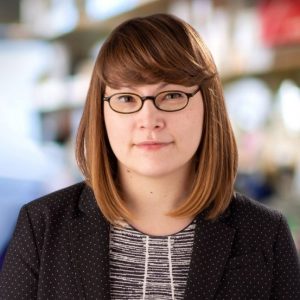
October 21, 2020
LA JOLLA—Salk Institute Assistant Professor Dannielle Engle has been awarded a New Investigator Award from the Tobacco-Related Disease Research Program (TRDRP) to examine how tobacco use promotes cellular changes that lead to pancreatic cancer. The TRDRP funds research that “enhances understanding of tobacco use, prevention and cessation, the social, economic and policy-related aspects of tobacco use, and tobacco-related diseases in California,” according to their website. Engle will receive over $1 million over three years to develop new models for examining how tobacco carcinogens (cancer-causing substances) lead to tumor development and metastasis.

Click here for a high-resolution image.
Credit: Salk Institute
“We are excited that Dannie’s work will be funded by the TRDRP, as her project has great potential to uncover the molecular drivers of pancreatic cancer that are amplified by exposure to tobacco,” says Salk President Rusty Gage. “Pancreatic cancer remains one of the deadliest cancers in the United States, and the Engle lab’s work is a critical part of the life-changing research being conducted here at Salk.”
The incidence of pancreatic cancer, specifically pancreatic ductal adenocarcinoma (PDA), is on the rise, and a significant risk factor for developing PDA is smoking. Investigation of the molecular connection between smoking and developing PDA may uncover ways to intercept transformation. Engle thinks that the carcinogens in tobacco likely increase inflammation and promote cellular stress leading to tumor development. To test this theory, Engle’s team will use pancreatic organoids, three-dimensional cellular models of the pancreas, to examine the changes that occur during the development of tumors after exposure to tobacco. Her goals are to establish organoid models for studying the effect of tobacco on cells and evaluate how different levels of tobacco exposure impact the formation and spread of pancreatic tumors.
“I am incredibly thankful for the support of the TRDRP,” says Engle, a member of Salk’s National Cancer Institute (NCI)-designated Salk Cancer Center. “This funding will enable my lab to investigate the underlying reasons why carcinogens present in tobacco products increase the risk for developing pancreas cancer. Our cutting-edge pancreatic organoid models are uniquely suited to identifying the mechanisms by which carcinogen exposure potentiates transformation.”
Engle was previously awarded the NIH NCI Career Transition K99/R00 award, the California Breast Cancer Research Program Fellowship and the UC San Diego Chancellor’s Fellowship.
Office of Communications
Tel: (858) 453-4100
press@salk.edu
Unlocking the secrets of life itself is the driving force behind the Salk Institute. Our team of world-class, award-winning scientists pushes the boundaries of knowledge in areas such as neuroscience, cancer research, aging, immunobiology, plant biology, computational biology and more. Founded by Jonas Salk, developer of the first safe and effective polio vaccine, the Institute is an independent, nonprofit research organization and architectural landmark: small by choice, intimate by nature, and fearless in the face of any challenge.